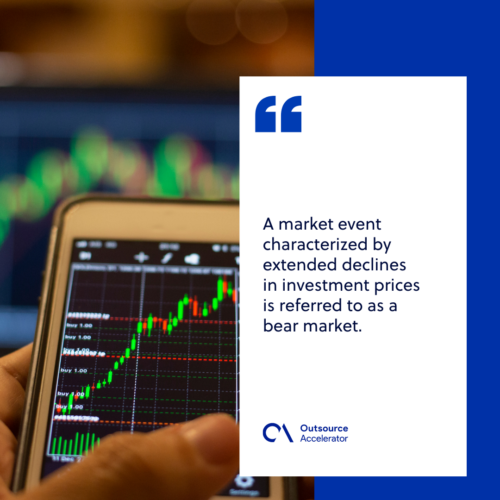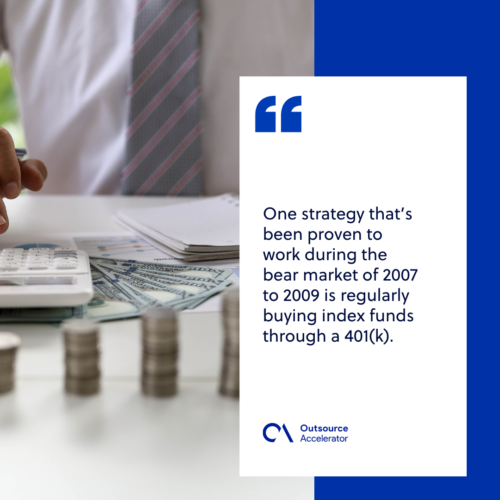Bear market
Definition
What is a bear market?
A market event characterized by extended declines in investment prices is referred to as a bear market. Generally, these declines reach at least 20% or more following recent highs and are accompanied by sweeping negative investor sentiment.
The term “bear market” is derived from the swipe of an attacking bear; the downward movement characterizes the plunging market prices. In contrast, the rising prices in bull markets are equated to the upward direction of a bull’s horn thrust.
While bear markets are typically overall drops in markets or indexes, such as the Nasdaq, individual commodities or securities can still be considered bearish if they fall more than 20% over a long period.

Phases of a bear market
Four distinct phases usually characterize bear markets:
- High prices and positive investor sentiment are signs of the first phase. As this phase nears its end, investors start dropping out of the market and raking in their profits.
- During the second phase, stock prices decline rapidly, trading activities start faltering, and corporate profits start falling. Once-positive economic indicators start shifting to below-average levels. As sentiments become dampened, some investors may panic and start capitulating.
- Speculators enter the market during the third phase, subsequently increasing some prices and volume of trading.
- In the final phase, security prices continue to fall, albeit more slowly. The low prices and encouraging news eventually draws in investors again, and the bear market slowly turns into a bullish one.
How to profit during a bear market
Although a bear market is a typically frightening market event, there are still ways to make it work to your advantage.
The 401(k)
One strategy that’s been proven to work during the bear market of 2007 to 2009 is regularly buying index funds through a 401(k), a type of retirement savings plan that goes directly into an investment account.
While it takes time to pay off and carries a certain risk — some investors’ 401(k) were nearly halved before the 2007-2009 bear market ended — the investment paid off when the markets picked up again and prices climbed higher.

Purchasing short- and long-term puts
“Puts” are options, or financial instruments, representing rights for 100 shares, a specific selling price, and a fixed expiration date before it becomes worthless. Puts bought from major indices rise in value as the indexes they were purchased from start declining.
Investors anticipating a developing bear market and having numerous long positions in the market can use this strategy to buy low-priced puts from major indices such as the Dow Jones Industrial Average, Nasdaq, and S&P 500.
However, short- and long-term put-buying is a high-risk strategy and should only be used by experienced investors.
Knowing which assets thrive in bear markets
Researching previous bear markets can give investors insights into which assets or stocks actually increased in value as the indexes went down.
Precious metals like gold and silver often stand out as stocks decline.
There are also “defensive stocks,” or stocks that perform well regardless of the markets’ current state. Food and personal care stocks, such as Coca-Cola and Johnson & Johnson, are among those counted as defensive stocks.







 Independent
Independent




